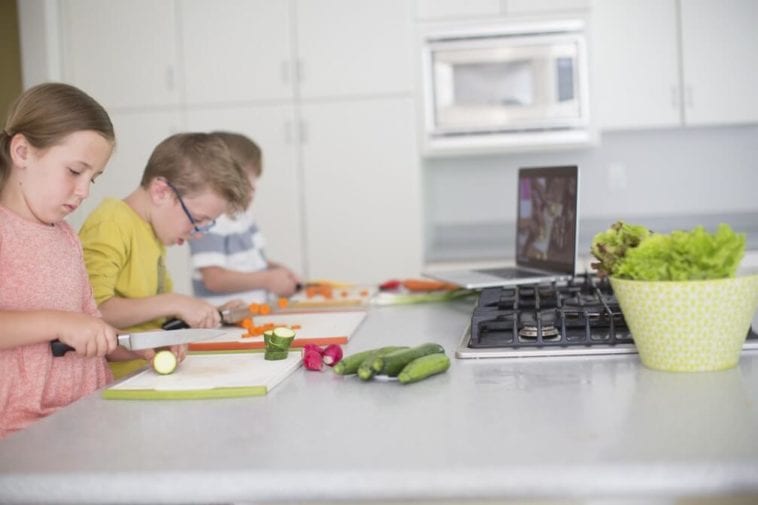Kids cook real food. Is this possible? With firm parental guidance and a good teaching process, it can.
Cooking home at home offers a lot of benefits, not just for moms, but also for their children. Homecooked food is often cheaper and more nutritious than fast food. You also help prevent food waste and wasted resources when you choose to do home cooking.
In fact, we highly advise you to check out our guide on meal planning, as this will help you get started on getting your kids on board with cooking at home.
If your kids are hesitant about it, then share these benefits of learning how to cook to them:
- You can save up some money instead of constantly buying take-outs by utilizing the ingredients you have at home
- It is an excellent hobby to learn
- It can help you get through college
- You will be able to cook for your family on family dinners and other occasions.
- Can help in learning how to budget instead of spending recklessly
Teaching kids to cook their own food also helps in their development. Here’s how.
How do Children Develop?
A German-American psychologist, Erik Erikson, coined the 8 Stages of Psychosocial Development of humans from toddlers to becoming old. This theory of his became one of his most famous and influential theories of development.
For this, I interviewed an Education student, who is familiar with this theory as it has been an essential topic discussed in their Professional Education subject, which is one of the fundamentals that every teacher must know and grasp wholly for the reason that a child’s way of development (i.e., surroundings, people around the child) can and might influence their personality and behavior as they grow older – as what Freud would like to emphasize in his Psychoanalytic Theory.
In one of the stages of Erikson’s Psychosocial Development, Autonomy vs. Shame and Doubt was highlighted as the second stage stating that children at this stage (2 to 3 years) learn to develop a sense of self-control – a part where the child learns to get hold of things and expresses a greater need for independence.

Upon surpassing this stage and moving forward to the following stages, children who practiced and mastered the art of independence will then be able to adapt to this growth as they grow older, which is why, if you noticed, children around 2 to 3 years old often likes to do things on their own. Such as choosing what clothes they would like to wear for an exciting outing or trying to style their hair frustratingly.
Despite their frustrating sighs because of failed attempts at styling their hair or tying a shoelace, it is a good practice to discover how to do basic things. According to First Discover, “Developing autonomy also gives the child a sense of self-efficacy (‘I can do it on my own) which promotes self-esteem and confidence and promotes motivation and perseverance in school.
Hence, parents are highly encouraged to allow their children to join them while doing chores at home, but with proper guidance. Parents serve as role models for young children. Hence, they would often enjoy imitating their parents, such as how they talk or what activities they usually do at home.

Take, for instance in cooking. Some would think that it is entirely dangerous for children to sneak around the kitchen when the adults are busy preparing dinner on Thanksgiving Day. Sure, the danger is undeniably anywhere, but allowing your children to help you – even if they would hold the spatula and play with the flour – with this practice gives them a sense of autonomy and trust – which means their parents trust them. Consequently, their motor skills and other physical and mental skills are developed.
Why Teach Kids How To Cook?
With that said, I am certain that I am not the only adult who got amazed and fascinated with children, as young as seven, who joined Junior Master Chef and cooked food better than most adults I know. Real food (i.e., Five-Spice Salmon with Roasted Cauliflower and Mashed Sweet Potatoes) and not just simple fried chickens and lasagnas.
Did you know that the youngest Junior Master Chef Winner was only nine (9) years old? Yes. Addison Osta Smith was the youngest winner in the history of the Junior Master Chef Competition. This proves that they can perform well in any field where adults are more inclined to despite their young age.
The Junior Master Chef Competition worldwide is only one of the several platforms where children learn how to cook real food. Not just that, but they also get to exchange witty remarks with the judges without awkwardness or any restrictions. In short, those children who auditioned and participated were able to enjoy two things – their passion for cooking and their happiness as children. However, the COVID-19 Pandemic restricted us with several opportunities, such as children hanging out with their playmates and adults enjoying some pamper time with their pals.
Worry no more because there are countless ways on how to learn at home. Albeit the threats of the pandemic prevents us from going back to the normal setup, one can still learn while enjoying the comforts of their home. And since we can find almost everything online, different offers are available anytime.
Hence, for parents with children who wants to learn and enhance their passion for cooking, worry no more, because there is no need for you to risk your child going out – apart from teaching them with your own recipes and whatnot – several online classes are ranging from different subjects and interests, where you can enroll your child. Need advice on how to encourage them? Simple! FOOD.

Food is an essential need that practically solves everything. When your child fails his Math exam, grab him a bite of ice cream and pizza, and it surely can lift the baggage in their shoulders. Cried because her friend Stacy did not let her borrow the doll she wanted to borrow? Simple. Take her out for lunch with her favorite go-to meal. Caught the flu and is too slow to move? Buy him his favorite food from McDonald’s and sit by the fireplace with him while enjoying Harry Potter movies.
Food is a temporary solution that can fill up the void in one’s feelings. It can lighten up someone’s mood – and can get your kids moving to know that there is food as a reward. We all know how listening while doing nothing can be tedious, but because of the food motivation, you can now expect your child to be attentive because he/she is already looking forward to something.
Need a fun, engaging course to help guide your kids to home cooking? Take the Kids Cook Real Food ecourse.
Kids Cook Real Food

Katie Kimball, a mom of four children, is the woman behind the e-course Kids Cook Real Food. She is a straight food lover, and cooking is her passion. However, due to her loaded schedules, she finds it hard to invite her children into the kitchen while she cooks – because who would want to mess our baked chicken with lemon zest, right? At the same time, she did not want her children to reach college and still has no idea how to cut vegetables or even onions.
So Katie opted to write down notes and guidelines because she wanted to share her methods, not only with her kids but with other people who are having a hard time learning how to cook. That was the point where she decided that kids need to learn how to cook real food.
Because of her exciting course, Katie has been invited to TEDx talks and was even featured on international television shows, where she willingly expressed her inspiration in creating such a platform and how it aims to motivate parents all over the world in realizing #KidsMealRevolution.
Despite that the course is called Kids Cook Real Food, the target audience of Katie was children and the parents of the children. It even includes The Healthy Parenting Connector, a dynamic video series connecting parents who want to raise healthy kids with the experts who have the information they need.
Kids Cook Real Food is both an educational and exciting platform because first, you get to hear the thoughts of Pediatricians without even going to their respective clinics to ask for advice. And of course, other influential individuals where parents can learn because of their food advice, practical tips, and healthy food diets for the children.
Here’s what you should know about this awesome cooking course for kids:
Levels of Cooking Courses for Kids Cook Real Food

“The best way to determine whether a child is Beginner, Intermediate, or Advanced is to peruse the Curriculum Map that lists the skills taught at each level.”
Katie Kimball has included different levels in her website where parents can decide which level their child is suitable to enroll in. There is a Beginners Level appropriate for ages 2-6 years old. Intermediate Level appropriate for ages 6-12. And an Advanced Level for teens.
Beginners Level is where fundamental lessons begin. (i.e., peeling correctly, measuring, cross-hatch dicing, careful pouring)
Intermediate Level – how to handle sharp knives and stoves. If your child can already manage to stand beside a hot stove and hold sharp knives properly, they are best suited to this level.
Advanced Level – basically a combination of the two previous levels.
Basically, you, as the parent, have the option to choose which level you best believe your child fits into. And from then on, you can slowly allow them to learn bits of pieces until the advanced level. A very wise and convenient way where anyone, regardless of age, can be accommodated.
Lastly, it also offers a solo version where your child can learn some lessons independently – the Kids Cook Solo independent training program, which is available by itself or if you are a part of their VIP membership.
How much does it cost?

“To teach one child all 3 levels, the 32 videos break down to just under $5 per lesson for VIP access that never expires (and there are over a dozen additional adult videos if you want them). Unlimited access will allow you to come back to new lessons as your child matures.”
Fun fact: The more children you enroll, the cheaper it gets. State, for instance, a family with three kids, the payment would only be “$149.95 one-time fee VIP membership comes out to only around $1.50 per lesson!”
If you are one busy parent but do not want to compromise your children’s right to learn basic skills that they will need in the future, such as cooking, Kids Cook Real Food is the suitable platform for you. It is tested and proven, and even nutritionists run to this website. Besides, cooking can have lots of benefits that your children will surely enjoy.
Conclusion
Allowing your children to explore new things apart from playing by the park benefits them greatly. They eventually learn the concept of independence and responsibility. Hence, you help take care of their self-esteem and establish their independent spirit.
Despite their young age, allow them to help you in the kitchen or while you are fixing the tire in your car. Expose them to some activities that they will surely need to learn as it can benefit them when the time comes that ability is necessary. Never isolate them nor neglect their wants as a child. With proper guidance, your children will significantly learn.
In fact, teaching kids to cook food is just one of the ways you can guide to a more sustainable life. Here you can teach them about reducing food waste, breaking free from single-use plastic, and the benefits of wholesome food. Then you can transition them to more aspects of the zero waste lifestyle. These include teaching them the art of DIY where they can reuse what they have as much as they can, starting their own herb or vegetable garden, and practicing proper waste management using the 5 Rs.




